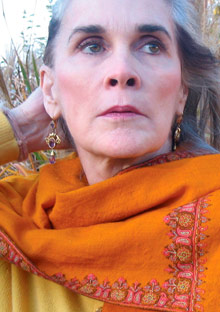Inside the Writer's Mind

Author Susanna Moore
PAGE 3
Susanna Moore: We writers are very interested in, if not obsessed with, the idea of what is true. (Ivy-Compton Burnett wrote: "It is not true that people have nothing to fear if they speak the truth. They have everything to fear. That is the reason for falsehood.")
It is a commonplace that autobiography is particularly vulnerable to untruth, whereas it is said that fiction never lies. Facts may be altered and reordered. Facts may be used to conceal the truth. In fiction the opposite is true. The artist must lie in order to tell the truth. Every word a writer writes has as its purpose a function of truth in that it is a choice—each word eliminates an endless number of possibilities. Style itself is a manifestation of what is true, a heightening of meaning, if we take for truth something more delicate, more fascinating than the not telling of a lie. There are, of course, endless layers of truth; style is one way to get to the heart of the matter. The seemingly untrue—the illogical, the absurd, the magical—are not exceptions to this. (Words themselves may be ambiguous, even mysterious, but not ambiguously so.) Illusions, fantasies, deceptions, fevers—these things are possible in a writer, even desired, all in the service of what is true.
Joshua Ferris: It takes no particular human quality for one to become a novelist save this: the ability to endure long stretches of time at one's desk. Not even that: Short bursts of intense time at one's desk will do. You don't even need an actual desk. You can be at a desk on the subway. You can be at a desk in the bathroom stalls. Wherever you give yourself over again to sustained meditation. Sustained meditation, specifically on your preoccupations, obsessions, overriding curiosities. Preoccupations and curiosities you believe best served not by the casual anecdote, the emotive e-mail, the journal entry, or the autobiographical essay, but through the variegated freedom that comes from making people out of words. People and planes landing on tarmacs and lost tourists at nightfall in a land of casual murder. Words spoken in a voice you search for and hold like water in your hand. A voice lost and recaptured over and over during your hours at your desk. A voice once borrowed from a chorus of voices you like best, now distilled from that chorus and distilled and distilled down to your specific range and harmony. A range and harmony that coalesce with your preoccupations and curiosities into a story of people made with words inhabiting a world inimitably yours. The people and the tarmacs and the tourists anxious to find their hotel in the dark. Inimitably yours because you shaped them hour after hour, at your desk. Their conflict, their destiny, in your inimitable voice, confronting the vagaries of your imagined world. Will they survive? The two hooded figures are approaching. The moon-dark beach is endless. What they would do to be home right now. What they would do to be at your desk, determining the fate of their world.
It is a commonplace that autobiography is particularly vulnerable to untruth, whereas it is said that fiction never lies. Facts may be altered and reordered. Facts may be used to conceal the truth. In fiction the opposite is true. The artist must lie in order to tell the truth. Every word a writer writes has as its purpose a function of truth in that it is a choice—each word eliminates an endless number of possibilities. Style itself is a manifestation of what is true, a heightening of meaning, if we take for truth something more delicate, more fascinating than the not telling of a lie. There are, of course, endless layers of truth; style is one way to get to the heart of the matter. The seemingly untrue—the illogical, the absurd, the magical—are not exceptions to this. (Words themselves may be ambiguous, even mysterious, but not ambiguously so.) Illusions, fantasies, deceptions, fevers—these things are possible in a writer, even desired, all in the service of what is true.
Joshua Ferris: It takes no particular human quality for one to become a novelist save this: the ability to endure long stretches of time at one's desk. Not even that: Short bursts of intense time at one's desk will do. You don't even need an actual desk. You can be at a desk on the subway. You can be at a desk in the bathroom stalls. Wherever you give yourself over again to sustained meditation. Sustained meditation, specifically on your preoccupations, obsessions, overriding curiosities. Preoccupations and curiosities you believe best served not by the casual anecdote, the emotive e-mail, the journal entry, or the autobiographical essay, but through the variegated freedom that comes from making people out of words. People and planes landing on tarmacs and lost tourists at nightfall in a land of casual murder. Words spoken in a voice you search for and hold like water in your hand. A voice lost and recaptured over and over during your hours at your desk. A voice once borrowed from a chorus of voices you like best, now distilled from that chorus and distilled and distilled down to your specific range and harmony. A range and harmony that coalesce with your preoccupations and curiosities into a story of people made with words inhabiting a world inimitably yours. The people and the tarmacs and the tourists anxious to find their hotel in the dark. Inimitably yours because you shaped them hour after hour, at your desk. Their conflict, their destiny, in your inimitable voice, confronting the vagaries of your imagined world. Will they survive? The two hooded figures are approaching. The moon-dark beach is endless. What they would do to be home right now. What they would do to be at your desk, determining the fate of their world.
Photo: Courtesy of Susanna Moore



